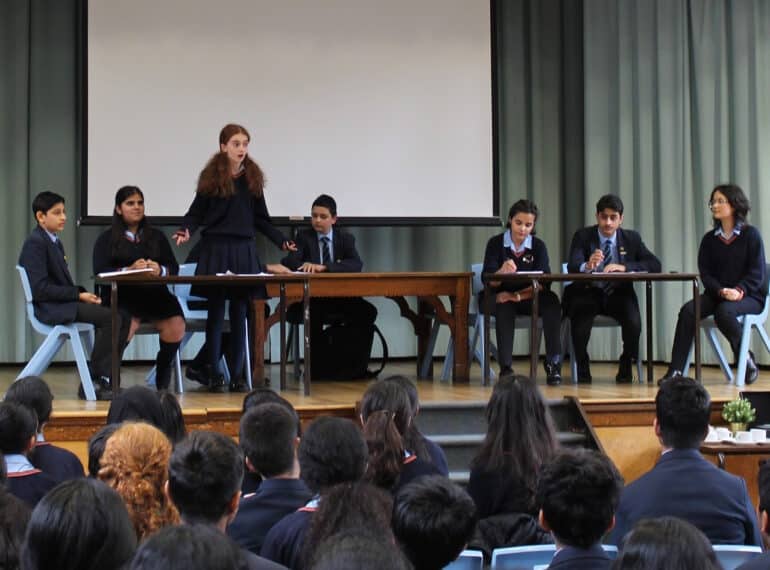
QE boys teamed up with pupils from a local leading girls’ school for a morning of enthusiastic debates on some of the hottest topics of the day.
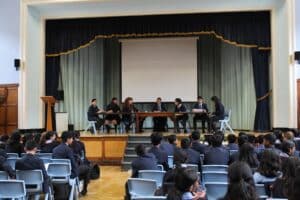 After the initial quickfire rounds, the morning with the guests from The Henrietta Barnett School (HBS) culminated in a final impassioned debate on the motion This House believes it was right to arrest the protesters at the King’s coronation.
After the initial quickfire rounds, the morning with the guests from The Henrietta Barnett School (HBS) culminated in a final impassioned debate on the motion This House believes it was right to arrest the protesters at the King’s coronation.
Hosted by QE, the debating challenge was attended by 144 selected Year 8 pupils from the two schools.
Headmaster Neil Enright said: “Our academic partnership with HBS provides a valuable opportunity for large numbers of our boys to work alongside young women, whether in subject-related symposia or, as on this occasion, in engaging with them in topical and political discussions.
“When it comes to developing your skills in debating, there is nothing like having to stand in front of a large audience – including many people that you don’t know – after a very limited preparation time and talking about something of which you may not have deep knowledge, setting out an argument concisely and then defending it adroitly when challenged!
“Such experiences constitute an important preparation for working alongside both women and men in pupils’ later lives, whether in higher education or in their careers.”
After the HBS pupils arrived at the start of the morning, they and the boys were split into six mixed groups in different rooms and given 20 minutes to work together using previously prepared material.
The event was run according to the ‘extended Mace format’, based on the long-running universities debating competition known originally as the Observer Mace. In this format, the debate is opened to audience participation after the first round of opening statements and rebuttals.
There were eight teams, comprising three debaters each, who took part in four debates. Other roles were a chair, who was responsible for keeping order and running the debate, a timekeeper and two reporters in each group, who took notes and helped teachers picked the best debater from their room.
Four debates took place over a period of 90 minutes. The motions debated were:
- This House would use animals for experimentation
- This House believes 16-year-olds should have the right to vote
- This House believes that all owners of large dogs should have to pass a test to prove they are able to control them
- This House would abolish homework.
After a break, the final debate took place in the Main Hall, featuring the best debaters from each of the six groups.
They were again given just 20 minutes to prepare. An initial vote indicated a roughly even split in the audience between those for and against the motion.
After the side arguing for the motion – the ‘Proposition’ – argued that the protest could have turned violent, the Opposition swiftly countered, pointing out that far from being violent, the protesters were not even disrupting the coronation, and adding that the police were, in fact, violating the protesters’ rights. The Proposition’s second speaker bolstered the arguments in favour of the motion by adducing the example of the Capitol riots in the USA.
When opened to the floor, there was a succession of attacks on the Proposition’s arguments, while the vagueness of the motion was itself criticised. After the audience debate, both sides summarised their arguments. A vote was again taken, and the result was now a landslide for the Opposition.

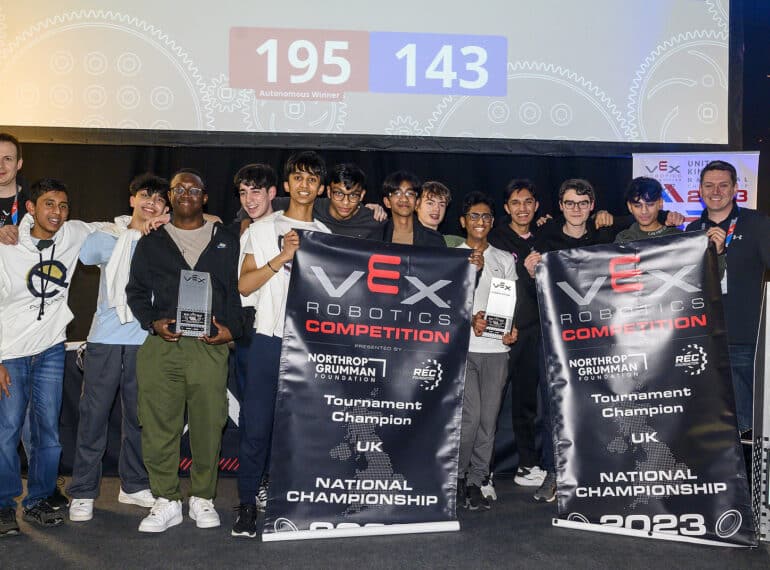
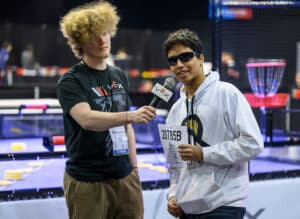 This year, QE sent six teams to the VRC National Championships at Telford International Centre for the first time. With six junior teams also making the journey, Queen Elizabeth’s School had more teams at the national finals than any other organisation.
This year, QE sent six teams to the VRC National Championships at Telford International Centre for the first time. With six junior teams also making the journey, Queen Elizabeth’s School had more teams at the national finals than any other organisation.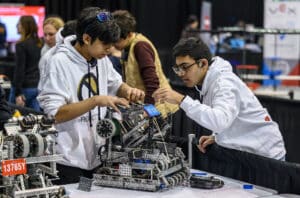 The QE boys benefitted from the support of corporate sponsor, Kingston Technology, sporting QE hoodies bearing the Kingston logo.
The QE boys benefitted from the support of corporate sponsor, Kingston Technology, sporting QE hoodies bearing the Kingston logo.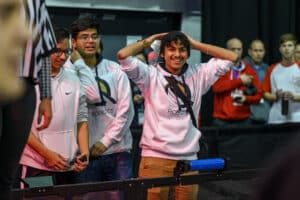 As the final stages progressed, high-performing QE sides found themselves facing each other, with Typhoon defeating Shattersquad in a Lovelace quarter-final and Nova beating Hybrid in a Brunel semi-final.
As the final stages progressed, high-performing QE sides found themselves facing each other, with Typhoon defeating Shattersquad in a Lovelace quarter-final and Nova beating Hybrid in a Brunel semi-final.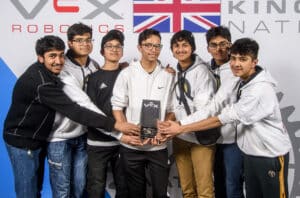 It was not to be, however. After a complicated series of events started when illegal parts were spotted on another team’s robot, Typhoon had to battle against the disadvantage of having to disable part of their own robot. They fought bravely alongside their alliance partner, but in the end, lost their deciding game by a single point, 133-134. “Divisional runners up, their pride was still intact and they learned a great deal from this experience,” said Mr Noonan.
It was not to be, however. After a complicated series of events started when illegal parts were spotted on another team’s robot, Typhoon had to battle against the disadvantage of having to disable part of their own robot. They fought bravely alongside their alliance partner, but in the end, lost their deciding game by a single point, 133-134. “Divisional runners up, their pride was still intact and they learned a great deal from this experience,” said Mr Noonan.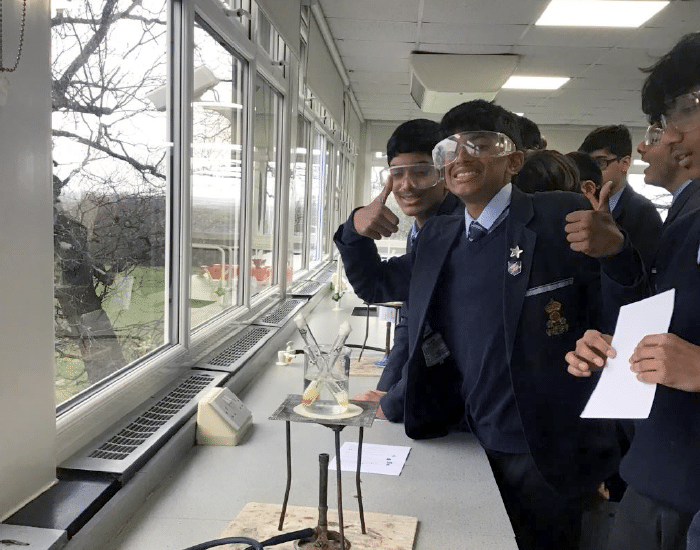
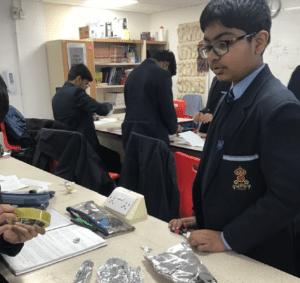 Year 8 boys conducted experiments to explore improvements in shipbuilding during Elizabeth I’s reign, to show how food was preserved in an age before refrigeration and to make their own Tudor-style soap.
Year 8 boys conducted experiments to explore improvements in shipbuilding during Elizabeth I’s reign, to show how food was preserved in an age before refrigeration and to make their own Tudor-style soap.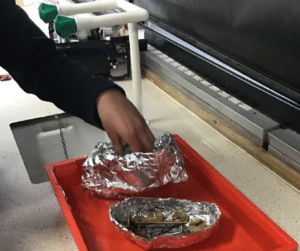 Another hands-on session involved making model boats out of aluminium foil to see which boat shape could hold the most mass. The boys learned that innovations by shipwrights during Elizabeth I’s reign allowed the introduction of ships that were faster, more manoeuvrable and carried heavier guns. The superiority of English ships was an important factor of the defeat of the Spanish Armada invasion fleet in 1588.
Another hands-on session involved making model boats out of aluminium foil to see which boat shape could hold the most mass. The boys learned that innovations by shipwrights during Elizabeth I’s reign allowed the introduction of ships that were faster, more manoeuvrable and carried heavier guns. The superiority of English ships was an important factor of the defeat of the Spanish Armada invasion fleet in 1588.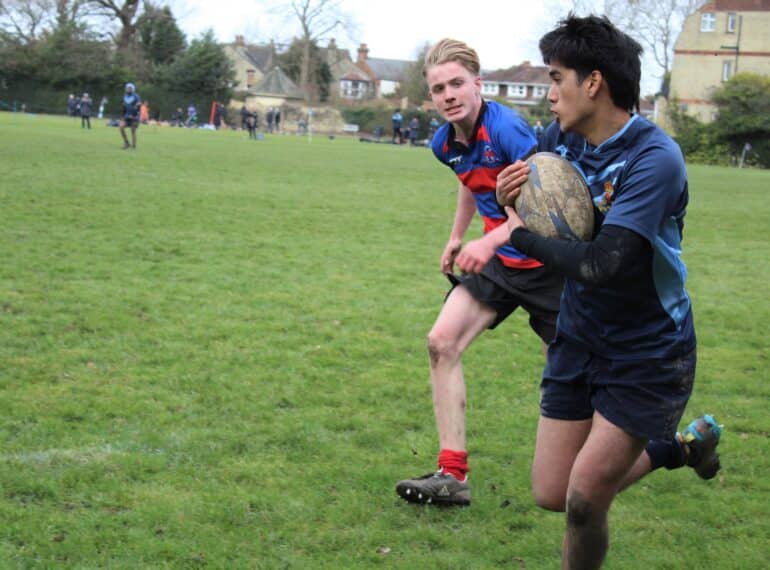
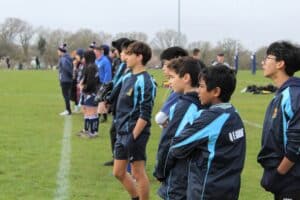 With events targeted at players from all years, the festival was one of a number of innovative subject festivals being held as part of QE’s new Flourish extra-curricular programme.
With events targeted at players from all years, the festival was one of a number of innovative subject festivals being held as part of QE’s new Flourish extra-curricular programme.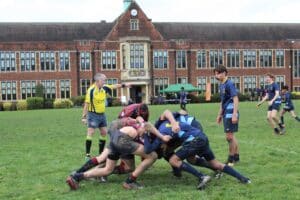 The festival began with last month’s 47th Annual QE Rugby Sevens Tournament, the second-largest schools sevens tournament in the country.
The festival began with last month’s 47th Annual QE Rugby Sevens Tournament, the second-largest schools sevens tournament in the country.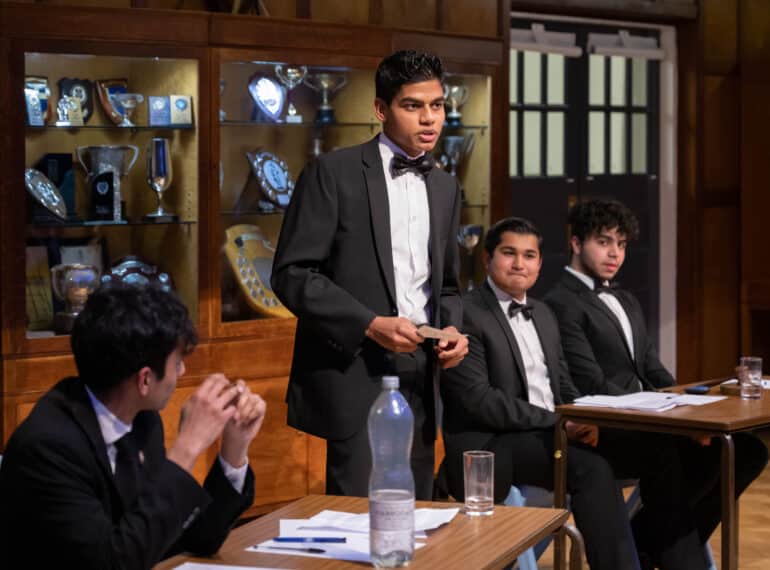
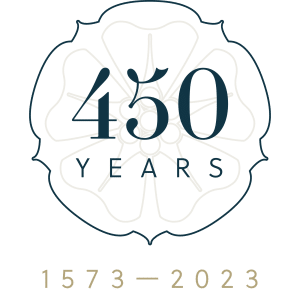 Sixth-formers gathered to take on the visiting Old Elizabethans, debating the motion, This House would leave the past behind us.
Sixth-formers gathered to take on the visiting Old Elizabethans, debating the motion, This House would leave the past behind us.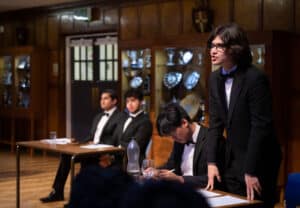 “The dinner participants also made a little bit of history themselves: our 2022 School, Captain Theo Mama-Kahn, led the loyal toast to ‘The King’, rather than ‘The Queen’, for the first time in the Dinner Debate’s history.”
“The dinner participants also made a little bit of history themselves: our 2022 School, Captain Theo Mama-Kahn, led the loyal toast to ‘The King’, rather than ‘The Queen’, for the first time in the Dinner Debate’s history.”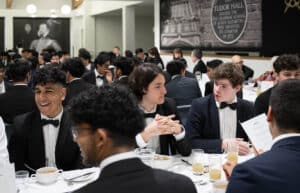 The motion was proposed by the Year 13 pair of Ashwin Sridhar and Sudhamshu Gummadavelly. Opposing it with Saifullah was Mipham Samten (OE 2012–2019). Many Year 13s contributed from the floor.
The motion was proposed by the Year 13 pair of Ashwin Sridhar and Sudhamshu Gummadavelly. Opposing it with Saifullah was Mipham Samten (OE 2012–2019). Many Year 13s contributed from the floor.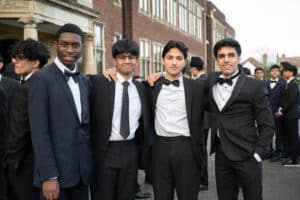 However, at the end of the debate, the proposers’ case had won many over, and the final totals were: 76 for; 55 against; and 39 abstentions. Thus, it was a victory for the School, the Upper Sixth pair successfully convincing people that the past could be left behind, even while its lessons were still being learned.
However, at the end of the debate, the proposers’ case had won many over, and the final totals were: 76 for; 55 against; and 39 abstentions. Thus, it was a victory for the School, the Upper Sixth pair successfully convincing people that the past could be left behind, even while its lessons were still being learned.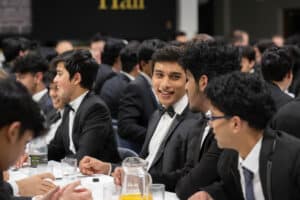 The experience heralded an era of competition success for Saifullah: he has now a record ten mooting and mock trial competitions, and has been a student speaker in six Cambridge Union Debates, the most in recent history.
The experience heralded an era of competition success for Saifullah: he has now a record ten mooting and mock trial competitions, and has been a student speaker in six Cambridge Union Debates, the most in recent history.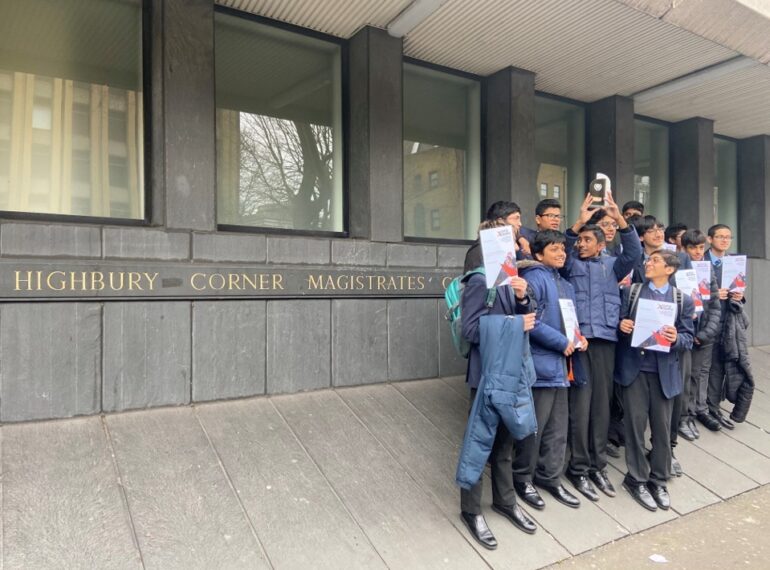
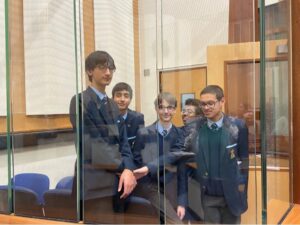 The 14-strong Year 9 team took part in two mock trials in the local heat of the Young Citizens Magistrates’ Court Mock Trial competition.
The 14-strong Year 9 team took part in two mock trials in the local heat of the Young Citizens Magistrates’ Court Mock Trial competition.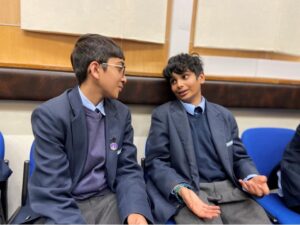 The competition judges were, in fact, real-life magistrates. “We had even had a visit from Magistrate Catherina Daly previously to help us prepare our case,” said Ms Shah. And, adding further to the competition’s verisimilitude, the heat was held at Highbury Corner Magistrates’ Court.
The competition judges were, in fact, real-life magistrates. “We had even had a visit from Magistrate Catherina Daly previously to help us prepare our case,” said Ms Shah. And, adding further to the competition’s verisimilitude, the heat was held at Highbury Corner Magistrates’ Court.